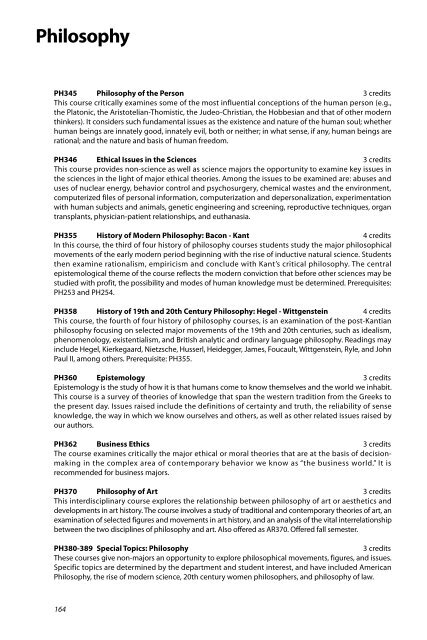PDF version - Saint Mary's University of Minnesota
PDF version - Saint Mary's University of Minnesota
PDF version - Saint Mary's University of Minnesota
Create successful ePaper yourself
Turn your PDF publications into a flip-book with our unique Google optimized e-Paper software.
Philosophy<br />
PH345 Philosophy <strong>of</strong> the Person 3 credits<br />
This course critically examines some <strong>of</strong> the most influential conceptions <strong>of</strong> the human person (e.g.,<br />
the Platonic, the Aristotelian-Thomistic, the Judeo-Christian, the Hobbesian and that <strong>of</strong> other modern<br />
thinkers). It considers such fundamental issues as the existence and nature <strong>of</strong> the human soul; whether<br />
human beings are innately good, innately evil, both or neither; in what sense, if any, human beings are<br />
rational; and the nature and basis <strong>of</strong> human freedom.<br />
PH346 Ethical Issues in the Sciences 3 credits<br />
This course provides non-science as well as science majors the opportunity to examine key issues in<br />
the sciences in the light <strong>of</strong> major ethical theories. Among the issues to be examined are: abuses and<br />
uses <strong>of</strong> nuclear energy, behavior control and psychosurgery, chemical wastes and the environment,<br />
computerized files <strong>of</strong> personal information, computerization and depersonalization, experimentation<br />
with human subjects and animals, genetic engineering and screening, reproductive techniques, organ<br />
transplants, physician-patient relationships, and euthanasia.<br />
PH355 History <strong>of</strong> Modern Philosophy: Bacon - Kant 4 credits<br />
In this course, the third <strong>of</strong> four history <strong>of</strong> philosophy courses students study the major philosophical<br />
movements <strong>of</strong> the early modern period beginning with the rise <strong>of</strong> inductive natural science. Students<br />
then examine rationalism, empiricism and conclude with Kant’s critical philosophy. The central<br />
epistemological theme <strong>of</strong> the course reflects the modern conviction that before other sciences may be<br />
studied with pr<strong>of</strong>it, the possibility and modes <strong>of</strong> human knowledge must be determined. Prerequisites:<br />
PH253 and PH254.<br />
PH358 History <strong>of</strong> 19th and 20th Century Philosophy: Hegel - Wittgenstein 4 credits<br />
This course, the fourth <strong>of</strong> four history <strong>of</strong> philosophy courses, is an examination <strong>of</strong> the post-Kantian<br />
philosophy focusing on selected major movements <strong>of</strong> the 19th and 20th centuries, such as idealism,<br />
phenomenology, existentialism, and British analytic and ordinary language philosophy. Readings may<br />
include Hegel, Kierkegaard, Nietzsche, Husserl, Heidegger, James, Foucault, Wittgenstein, Ryle, and John<br />
Paul II, among others. Prerequisite: PH355.<br />
PH360 Epistemology 3 credits<br />
Epistemology is the study <strong>of</strong> how it is that humans come to know themselves and the world we inhabit.<br />
This course is a survey <strong>of</strong> theories <strong>of</strong> knowledge that span the western tradition from the Greeks to<br />
the present day. Issues raised include the definitions <strong>of</strong> certainty and truth, the reliability <strong>of</strong> sense<br />
knowledge, the way in which we know ourselves and others, as well as other related issues raised by<br />
our authors.<br />
PH362 Business Ethics 3 credits<br />
The course examines critically the major ethical or moral theories that are at the basis <strong>of</strong> decisionmaking<br />
in the complex area <strong>of</strong> contemporary behavior we know as “the business world.” It is<br />
recommended for business majors.<br />
PH370 Philosophy <strong>of</strong> Art 3 credits<br />
This interdisciplinary course explores the relationship between philosophy <strong>of</strong> art or aesthetics and<br />
developments in art history. The course involves a study <strong>of</strong> traditional and contemporary theories <strong>of</strong> art, an<br />
examination <strong>of</strong> selected figures and movements in art history, and an analysis <strong>of</strong> the vital interrelationship<br />
between the two disciplines <strong>of</strong> philosophy and art. Also <strong>of</strong>fered as AR370. Offered fall semester.<br />
PH380-389 Special Topics: Philosophy<br />
3 credits<br />
These courses give non-majors an opportunity to explore philosophical movements, figures, and issues.<br />
Specific topics are determined by the department and student interest, and have included American<br />
Philosophy, the rise <strong>of</strong> modern science, 20th century women philosophers, and philosophy <strong>of</strong> law.<br />
164
















